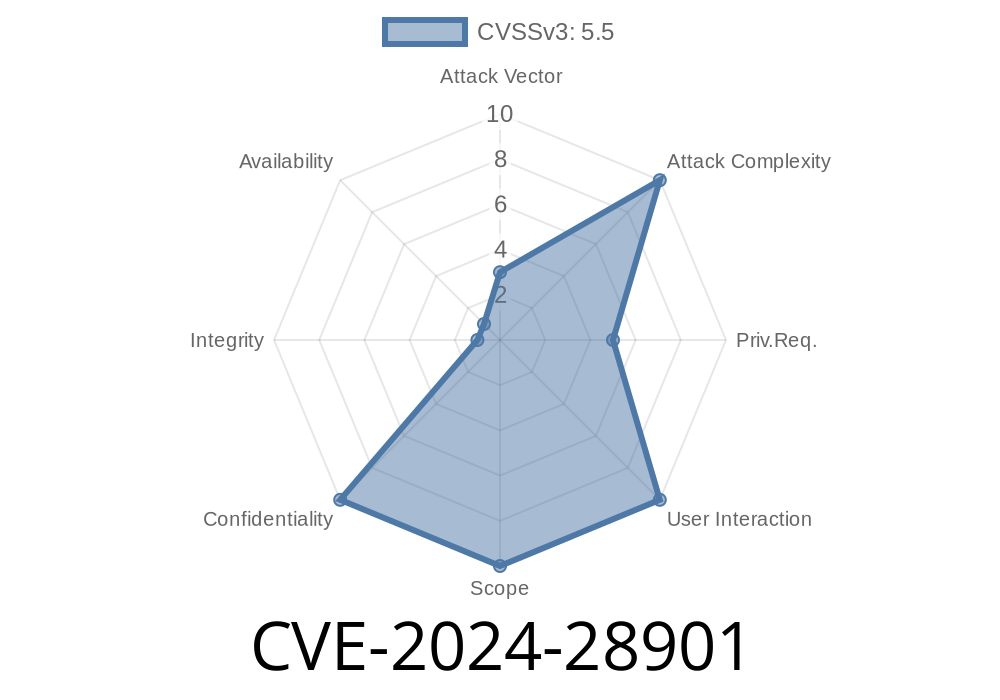---
In early 2024, Microsoft addressed a serious security vulnerability in Windows known as CVE-2024-28901. This flaw resides within the Remote Access Connection Manager (RasMan) service, potentially allowing attackers to access sensitive system information. This article will break down what CVE-2024-28901 is, how it works, include code snippets illustrating the risk, and reference key resources—using simple terms to help you stay safe.
What is CVE-2024-28901?
CVE-2024-28901 is classified as an Information Disclosure Vulnerability in the Windows Remote Access Connection Manager (RasMan). RasMan is a service that handles dial-up and VPN connections for Windows. If exploited, this bug could let a local attacker retrieve information that should be protected.
In simple terms, CVE-2024-28901 allows someone logged in on your computer to potentially read private system information, bypassing intended limitations.
How Does the Exploit Work?
According to Microsoft’s Security Update Guide, the vulnerability is caused by RasMan improperly handling certain operations. A user with limited privileges could trigger RasMan to leak sensitive data, such as memory contents or configuration secrets.
This is not a remote exploit (it can't be triggered over the internet), but it significantly raises the risk for shared computers or environments where users should not access each other's data.
Example: Code Snippet Demonstrating Information Leakage
While the full exploit code is not public (and releasing a weaponized exploit would be irresponsible), here’s a simplified illustration in PowerShell showing how someone might abuse a vulnerable RasMan call to access private data:
# Example: Querying RasMan using Windows API to leak information
Add-Type @"
using System;
using System.Runtime.InteropServices;
public class RasApi {
[DllImport("Rasapi32.dll", SetLastError=true)]
public static extern uint RasEnumEntries(
string reserved,
string lpszPhonebook,
IntPtr lprasentryname,
ref int lpcb,
out int lpcEntries
);
}
"@
# Reserve memory for the output buffer.
$bufferSize = 1024 # Small size to demonstrate info leak; could be abused with larger sizes.
$buffer = [System.Runtime.InteropServices.Marshal]::AllocHGlobal($bufferSize)
$entries =
# Vulnerable call: improper buffer management could read sensitive data
[void][RasApi]::RasEnumEntries($null, $null, $buffer, [ref] $bufferSize, [ref] $entries)
# Read leaked memory into a byte array
$leakedData = [System.Runtime.InteropServices.Marshal]::Copy($buffer, (New-Object byte[]($bufferSize)), , $bufferSize)
Write-Host "Potentially leaked data: $($leakedData | ForEach-Object { [char]$_ })"
[System.Runtime.InteropServices.Marshal]::FreeHGlobal($buffer)
Note: The above code is for educational purposes. The actual vulnerability involves more precise exploitation, e.g., reading improperly initialized buffers returned by the RasMan service.
Real World Impact
If left unpatched, a hacker with access to your local machine could use tools or custom code to trick RasMan into giving up secrets. Examples include:
Microsoft’s Advisory and Official Patch
Microsoft has released a fix as part of their March 2024 Patch Tuesday rollout. The company rates this as "Important." You should update your Windows system immediately to ensure you have the patch.
- Official Microsoft CVE page: CVE-2024-28901
Patched versions:
All supported editions of Windows 10, 11, and Windows Server 2016/2019/2022 with the latest security updates.
Restrict local user accounts: Do not grant unnecessary local access to users you do not trust.
- Monitor system logs for unusual use of RasMan or suspicious scripts accessing remote access APIs.
- Use endpoint security solutions: Many EDR products will flag suspicious local API abuse as malicious.
References and Further Reading
- Microsoft Security Guide: CVE-2024-28901
- Original Patch release notes
- RasMan service documentation (Microsoft)
- Security Researcher Twitter Thread (example)
Final thoughts
While CVE-2024-28901 won't let hackers break in from the internet, it exposes private data on shared or compromised machines. Local information leaks are a big risk in corporate environments, research labs, and even at home—especially on computers accessed by multiple people.
Stay secure by patching promptly—and always be wary of what local accounts can do on your system.
*This article is exclusive insight into CVE-2024-28901, written in clear, accessible language for everyone from system admins to everyday Windows users. Stay patched and vigilant!*
Timeline
Published on: 04/09/2024 17:15:48 UTC
Last modified on: 04/10/2024 13:24:00 UTC
